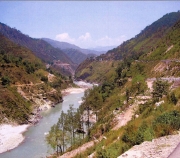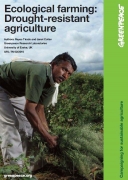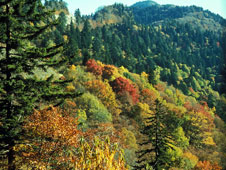News and Articles
Blueprint for farm growth
Posted on 28 Dec, 2010 03:12 PM
Since the start of the 11th Five Year Plan, the growth rate in agriculture has virtually remained stagnant. A scene at a paddy field in the outskirts of Hyderabad.
Assessment of the status of environment and forest clearances of hydropower projects on river Mandakini – A report by MoEF
Posted on 27 Dec, 2010 02:08 PM This report by MoEF regarding the environmental impact of Phata-Byung & Singoli-Bhatwari hydro power projects on the river Mandakini deals with the additional safeguards and proper monitoring & supervision to help protect the environment in these project areas. It says that since a fairly large portion of the works has been taken up it may not be worth to abandon the project. It has proposed certain remedial measures to mitigate the damage if caused to the environment and local villagers.
This report by MoEF regarding the environmental impact of Phata-Byung & Singoli-Bhatwari hydro power projects on the river Mandakini deals with the additional safeguards and proper monitoring & supervision to help protect the environment in these project areas. It says that since a fairly large portion of the works has been taken up it may not be worth to abandon the project. It has proposed certain remedial measures to mitigate the damage if caused to the environment and local villagers.
The Phata-Byung and Singoli-Bhatwari hydro power projects, are Run of the River (RoR) projects on the river Mandakini. The series of RoR projects proposed and under construction as a part of cascade development are to generate electrical energy which is considered to be clean power as it is non-polluting and renewable in nature.
Mitigating climate change through organic agriculture - Keynote address at the Third Organic Farming Association of India Convention, held at Anand, Gujarat (2010)
Posted on 25 Dec, 2010 10:43 PMGreen Revolution (GR) technologies, supported by official policies, and fuelled by agro-chemicals, machinery and irrigation, are well known to have improved agricultural production and productivity. While these technologies greatly helped developing countries to address their food-security and food-sovereignty needs, farmers using these technologies have had to depend on external inputs.
Cancun: Is it a climate meet with a difference?
Posted on 25 Dec, 2010 07:58 PMDespite the pre-Cancun Wikileaks revelation of U.S. strong-arm tactics at the Copenhagen summit, and U.S. climate envoy Todd Stern's remarks about "climate bribery", wherein he said countries asking for aid were in no position to accuse the U.S. of bribery; it is largely perceived that the Cancun Climate Meet has picked up the lost momentum of Copenhagen.
193 nations met at Cancun to debate on how to move forward on the climate change adaptation process and drafted the Cancun Agreement.
Saving rice - Ambitious plans to increase productivity
Posted on 24 Dec, 2010 10:13 AMEnormous funds are being poured into research aimed at improving seed varieties, with a heavy focus on developing hybrid rice. Is it the right option for millions of small rice farmers who are already battling high input costs and increasingly unpredictable weather? Or does part of the solution lie in efficient methods of cultivation that will cut down water use and improve yield?
Rice intensification for increasing productivity in Koraput, Odisha
Posted on 24 Dec, 2010 10:12 AM
Photo: Muralidhar Adhikari
Land acquisition for Renuka dam continues despite uncertainties - Press release from the Renuka Bandh Sangharsh Samiti
Posted on 21 Dec, 2010 12:24 PMForwarded to the portal by: Manshi Asher
Content Courtesy: Himvani
Author: Renuka Bandh Sangharsh Samiti
Despite protest against forced acquisition of land, Himachal Pradesh Power Corporation Limited (HPPCL) and revenue administration today notified Section 9 of the Land Acquisition Act 1894, for approximately 680 big has (about 57 hectares) of land of Panaar Village for the Renuka Dam Project. In a letter to the Chief Justice of Himachal Pradesh High Court sent today, activists appealed for a stay on land acquisition for the project, considering the uncertainty surrounding the project.
Effluent treatment facilities across Golden Corridor does not conform to GPCB norms – A press release by Paryavaran Suraksha Samiti
Posted on 20 Dec, 2010 10:39 PMContent Courtesy: Radical Socialist
Author: Paryavaran Suraksha Samiti
In this press release dated 4th June 2010, the Paryavaran Suraksha Samiti expresses concern that the effluent treatment facilities across the Golden Corridor do not conform to the Gujarat State Pollution Control Board (GPCB) and demands that effluent discharge at Tadgam Sarigam Pipeline, from FETP, Ankleshwar, ECP, Vadodara and CETPs of Ahmedabad be stopped.
Ecological farming: Drought resistant agriculture – A paper by Greenpeace
Posted on 20 Dec, 2010 08:09 PM This paper by Greenpeace on ecological farming illustrates proven, modern farming approaches that help cope with drought. It elaborates on the drought-resistant crop varieties and calls for policy makers to increase funds for research on the system.
This paper by Greenpeace on ecological farming illustrates proven, modern farming approaches that help cope with drought. It elaborates on the drought-resistant crop varieties and calls for policy makers to increase funds for research on the system.
Human-induced climate change is resulting in less and more erratic rainfall, especially in regions where food security is very low. The poor in rural and dry areas will suffer the most and will require cheap and accessible strategies to adapt to erratic weather. This adaptation will need to take into account not only less water and droughts, but also the increased chance of extreme events like floods.
Biodiversity and a healthy soil are central to ecological approaches to making farming more drought-resistant and more resilient to extreme events. Practices that make soils better able to hold soil moisture and reduce erosion and that increase biodiversity in the system help in making farm production and income more resilient and stable.
Greener climate prediction by NASA shows plants slow warming
Posted on 20 Dec, 2010 06:01 PMArticle and Image Courtesy: NASA
A new NASA computer modeling effort has found that additional growth of plants and trees in a world with doubled atmospheric carbon dioxide levels would create a new negative feedback – a cooling effect – in the Earth's climate system that could work to reduce future global warming.
 A new NASA modeling effort found that in a doubled-carbon dioxide world plant growth could lessen global warming by about 0.3 degrees C globally. The same model found that the world would warm by 1.94 degrees C without this cooling feedback factored in. Image: Great Smoky Mountains National Park; Credit: National Park Service
A new NASA modeling effort found that in a doubled-carbon dioxide world plant growth could lessen global warming by about 0.3 degrees C globally. The same model found that the world would warm by 1.94 degrees C without this cooling feedback factored in. Image: Great Smoky Mountains National Park; Credit: National Park Service
